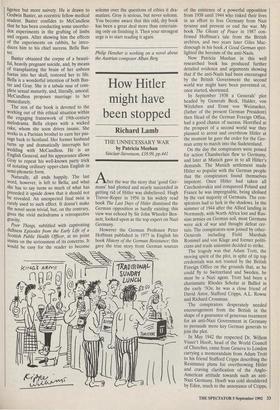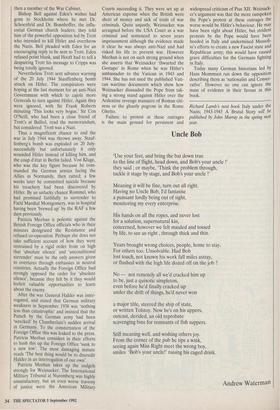How Hitler might have been stopped
Richard Lamb
THE UNNECESSARY WAR by Patricia Meehan Sinclair-Stevenson, £18.99, pp.44 I After the war the story that 'good Ger- mans' had plotted and nearly succeeded in getting rid of Hitler was disbelieved. Hugh Trevor-Roper in 1956 in his widely read book The Last Days of Hitler dismissed the German opposition as hardly existing; this view was echoed by Sir John Wheeler Ben- nett, looked upon as the top expert on Nazi Germany.
However the German Professor Peter Hoffman published in 1977 in English his book History of the German Resistance; this gave the true story from German sources
of the existence of a powerful opposition from 1938 until 1944 who risked their lives in an effort to free Germany from Nazi tyranny and prevent or end the war. My book The Ghosts of Peace in 1987 con- firmed Hoffman's tale from the British archives, and two years later Giles Mac- donough in his book A Good German spot- lighted the heroism of the anti-Nazis.
Now Patricia Meehan in this well researched book hss produced further detailed evidence and arguments showing that if the anti-Nazis had been encouraged by the British Government the second world war might have been prevented or, once started, shortened.
In September 1938 a Generals' plot headed by Generals Beck, Haider, von Witzleben and Ernst von Weizsacker, (father of the present German President) then Head of the German Foreign Office, had a good chance of success. Horrified at the prospect of a second world war they planned to arrest and overthrow Hitler at the moment he gave the order for the Ger- man army to march into the Sudetenland.
On the day the conspirators were poised for action Chamberlain flew to Germany, and later at Munich gave in to all Hitler's demands. The Munich settlement made Hitler so popular with the German people that the conspirators found themselves impotent. Once Hitler had taken all Czechoslovakia and conquered Poland and France he was impregnable, being idolised by the vast majority of Germans. The con- spirators had to lurk in the shadows. In the summer of 1944 after the Allied landing in Normandy, with North Africa lost and Rus- sian armies on German soil, most Germans were sick of war and thought defeat cer- tain. The conspirators now joined by other- Generals including Field Marshals Rommel and von Kluge and former politi- cians and trade unionists decided to strike.
The tragedy was that Adam Trott, the moving spirit of the plot, in spite of tip top credentials was not trusted by the British Foreign Office on the grounds that, as he could fly to Switzerland and Sweden, he must be a Nazi agent. Trott had been a charismatic Rhodes Scholar at Balliol in the early '30s; he was a close friend of David Astor, Stafford Cripps, A.L. Rowse and Richard Crossman.
The conspirators desperately needed encouragement from the British in the shape of a guarantee of generous treatment for an anti-Nazi Government in Germany to persuade more key German generals to join the plot.
In May 1942 the respected Dr. Willem Visser't Hooft, head of the World Council of Churches, came from Geneva to London carrying a memorandum from Adam Trott to his friend Stafford Cripps describing the Resistance plans for overthrowing Hitler and craving clarification of the Anglo- American attitude towards such an anti- Nazi Germany. Hooft was cold shouldered by Eden, much to the annoyance of Cripps, then a member of the War Cabinet.
Bishop Bell against Eden's wishes had gone to Stockholm where he met Dr. Schoenfeld and Dr. Bonnhoffer, the influ- ential German church leaders; they told him of the powerful opposition led by Trott who intended to kill Hitler and overthrow the Nazis. Bell pleaded with Eden for an encouraging reply to be sent to Trott. Eden refused point blank, and Hooft had to tell a despairing Trott his message to Cripps was being totally ignored.
Nevertheless Trott sent advance warning of the 20 July 1944 Stauffenberg bomb attack on Hitler. The conspirators were hoping at the last moment for an anti-Nazi Government with which to cajole more Generals to turn against Hitler. Again they were ignored, with Sir Frank Roberts minuting 'This looks very bogus.' Sir Con O'Neill, who had been a close friend of Trott's at Balliol, read the memorandum, but considered Trott was a Nazi.
Thus a magnificent chance to end the war in July 1944 was thrown away. Stauf- fenberg's bomb was exploded on 20 July- successfully but unfortunately it only wounded Hitler instead of killing him, and the coup d'etat in Berlin failed. Von Kluge, who was the key figure because he com- manded the German armies facing the Allies in Normandy, then ratted; a few weeks later he committed suicide because his treachery had been discovered by Hitler. By an unlucky chance Rommel, who had promised faithfully to surrender to Field Marshal Montgomery, was in hospital having been 'brewed up' by the RAF a few days previously.
Patricia Meehan is polemic against the British Foreign Office officials who in their minutes denigrated the Resistance and refused co-operation. Perhaps she does not take sufficient account of how they were restrained by a rigid order from on high that 'absolute silence' and 'unconditional surrender' must be the only answers given to overtures through embassies in neutral countries. Actually the Foreign Office had strongly opposed the order for 'absolute silence', because they felt by it they would forfeit valuable opportunities to learn about the enemy.
After the war General Halder was inter- rogated, and stated that German military weakness in September 1938 was 'nothing less than catastrophic' and insisted that the Putsch by the German army had been 'wrecked' by Chamberlain's sudden arrival in Germany. To the consternation of the Foreign Office this was leaked to the press. Patricia Meehan considers in their efforts to hush this up the Foreign Office 'sank to a new low'. The most damaging minute reads 'The best thing would be to discredit Haider in an interrogation of our own'.
Patricia Meehan takes up the cudgels strongly for Weizsacker. The International Military Tribunal at Nuremberg was highly unsatisfactory, but an even worse travesty of justice were the American Military Courts succeeding it. They were set up at Atherican expense when the British were short of money and sick of trials of war criminals. Quite unjustly, Weizsacker was arraigned before the USA Court as a war criminal and sentenced to seven years imprisonment although the evidence made it clear he was always anti-Nazi and had risked his life to prevent war. However Meehan is not on such strong ground when she asserts that Weizsacker 'thwarted the Gestapo' in Rome when he was Hitler's ambassador to the Vatican in 1943 and 1944. She has not used the published Vati- can wartime documents which show how Weizsacker dissuaded the Pope from tak- ing a strong stand against Hitler over the Ardeatine revenge massacre of Roman citi- zens or the ghastly pogrom in the Rome Ghetto.
Failure to protest at these outrages is the main ground for persistent and
widespread criticism of Pius XII. Weizsack- er's argument was that the more outspoken the Pope's protest at these outrages the worse would be Hitler's behaviour. He may have been right about Hitler, but strident protests by the Pope would have been heeded in Italy and undermined Mussoli- ni's efforts to create a new Fascist state and Republican army; this would have caused grave difficulties for the Germans fighting in Italy. Today many German historians led by Hans Mommsen run down the opposition describing them as 'nationalist and Conser- rative'. However no one can ignore the mass of evidence in their favour in this book.
Richard Lamb's next book Italy under the Nazis; 1943-1945 A Brutal Story will be published by John Murray in the spring next year.



















































 Previous page
Previous page